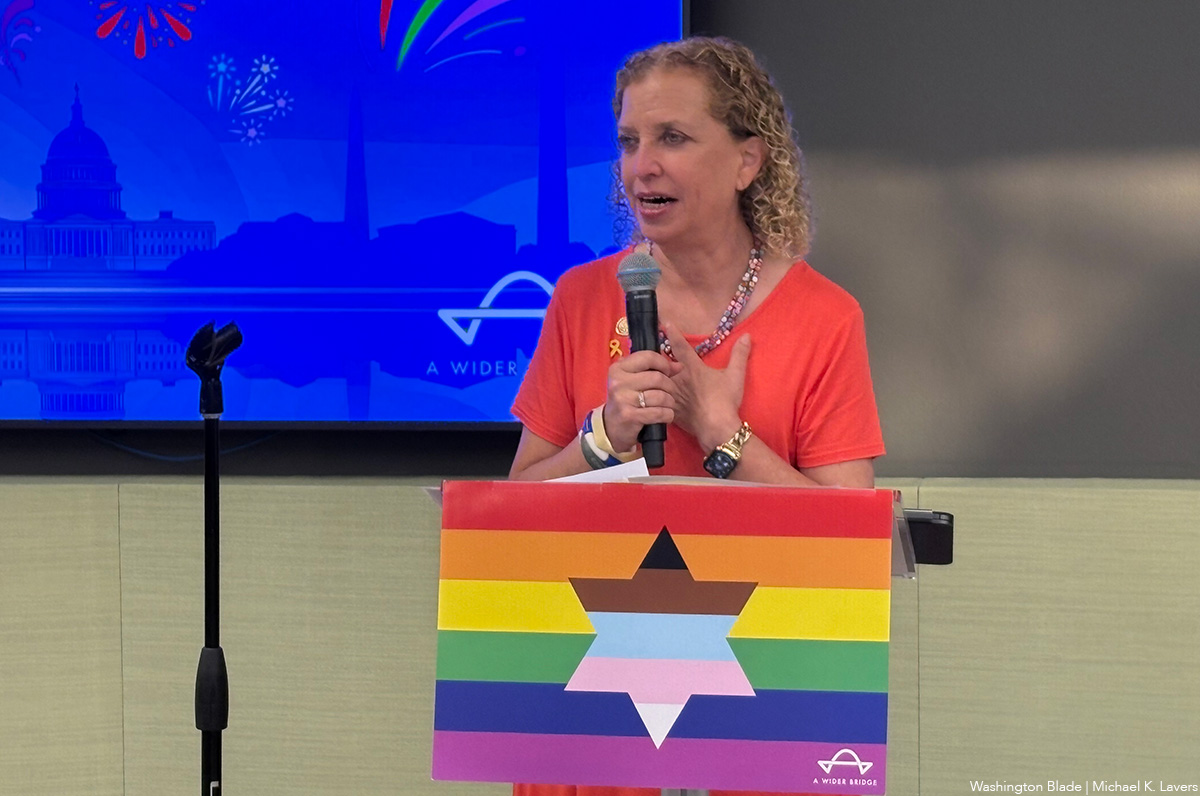National
After ‘Don’t Ask’ repeal, what’s next?
‘Our goals have been met’

Groups that worked to advance “Don’t Ask, Don’t Tell” repeal last year aren’t resting on their laurels as they continue to see work ahead in ensuring that open service is implemented and gays in the military are treated fairly.
In the near term, the main priority for those organizations now that President Obama has signed legislation allowing for “Don’t Ask, Don’t Tell” repeal is to ensure that certification of open service happens swiftly.
Aubrey Sarvis, executive director of the Servicemembers Legal Defense Network, said his organization will pursue open service as required by the law signed by the president.
“Dec. 22 was a great day, but the reality is, we don’t have repeal,” Sarvis said. “The reality is ‘Don’t Ask, Don’t Tell’ is still the law. So, our first priority is the first 90, the first 180 days is to get certification.”
Aaron Belkin, director of the Palm Center, a think tank on gays in the military at the University of California, Santa Barbara, said his organization will be in “monitoring mode” for possibly the remainder of the year.
“The finishing line is here, but we haven’t crossed it yet, unless and until we get certification and good regulations,” Belkin said. “Our job at this point is to just make sure that the process continues and that if there’s any foot-dragging at the Pentagon, that we call attention to it.”
Belkin said he anticipates the Palm Center will produce another study about three or six months after certification is issued to determine if implementation was successful.
The measure Obama signed would only enact open service after the president, the defense secretary and the chairman of the Joint Chiefs of Staff certify that the U.S. military is ready for “Don’t Ask, Don’t Tell” repeal.
Further, after certification takes place, a 60-day waiting period for congressional review must pass before gays can serve openly in the U.S. military without fear of discharge.
In the State of the Union address on Tuesday, Obama committed to certifying “Don’t Ask, Don’t Tell” repeal before the year is out. The president said he expects certification to happen in a “matter of months” in an interview last month with The Advocate.
Defense Secretary Robert Gates has said he won’t issue certification for open service until new regulations are drafted and training has been instituted in the armed forces.
Beyond certification, groups working on “Don’t Ask, Don’t Tell” foresee a number of outstanding tasks that will remain, including providing legal services and ensuring that benefits are offered to gay troops.
Sarvis said SLDN will continue to provide legal services to gay service members who are facing discharges or who have questions about coming out while in service.
“I think, as an organization, SLDN will still be here providing legal services, working with Congress on oversight and being a resource to the Pentagon to make open service a reality,” he said.
Sarvis said since the legislation was signed, SLDN has heard from more than 225 service members who’ve called with questions about continuing to serve safely or receiving benefits in the post-repeal military.
Further, Sarvis said ensuring gay service members receive the same benefits afforded to straight service members would be another aim for SLDN.
“The post-repeal focus, in large part, will be parity for LGBT service members — particularly parity with respect to benefits: health benefits, GI benefits across the board,” Sarvis said.
The Pentagon report on “Don’t Ask, Don’t Tell” — published Nov. 30 — states that the Defense of Marriage Act prohibits the U.S. military from affording many benefits to same-sex partners of service members, but other benefits, such as death benefits and hospital visitation access, would still be available.
Sarvis said a combination of DOMA and other regulations prohibit gay service members from receiving the same benefits as their straight counterparts, but there is some leeway.
“There are some instances where the [defense] secretary has some authority with respect to definitional changes for dependents … but for most benefits, particularly involving spouses … DOMA is a big barrier,” Sarvis said.
Belkin also acknowledged that a number of tasks will remain even after certification takes place and open service is implemented — although he said he doesn’t know if the Palm Center would be the best organization to address them.
Among the outstanding jobs that Belkin cited are providing employee resources to liaison between gay troops and the Pentagon; promoting public education on transgender people in the U.S. military; and working with the Department of Veterans Affairs to create programming for gay service members.
Beyond the upcoming year, Belkin said he isn’t sure what tasks the Palm Center will pursue, but added he suspects consultation with other organizations could be on the agenda.
“We’ll be offering advice or pro-bono consulting to any organization that wants to learn some of the lessons that we learned along the way about public education and how to use social science to inform public policy conversations,” Belkin said.
Pro-LGBT groups that took on “Don’t Ask, Don’t Tell” as part of a portfolio that included other issues plan to continue to use resources for other items on the agenda.
Fred Sainz, HRC’s vice president of communications, said his organization last year contributed about $3.5 million to the “Don’t Ask, Don’t Tell” repeal effort. But he cautioned against asking where that money would go this year.
“It’s not necessarily a fair posit to say, ‘You have these resources, which you dedicated to “Don’t Ask, Don’t Tell,” what are you going to do with that pot of money now?'” Sainz said. “Because as you know, the [‘Don’t Ask, Don’t Tell’] issue changed considerably over the course of the year and we don’t yet know either the opportunities or the vulnerabilities that we have going into this coming year.”
One lingering question: What will anti-gay groups dedicated to keeping “Don’t Ask, Don’t Tell” on the books do now that legislative action on repealing the law is complete.
Elaine Donnelly, president of the Michigan-based Center for Military Readiness, was among the leading advocates attempting to stop gays from serving openly in the military. The “forced intimacy” of having gay troops serve with straight service members was among her favorite phrases.
The Center for Military Readiness didn’t respond to multiple requests on what the organization will pursue now that legislation has been passed to repeal “Don’t Ask, Don’t Tell.”
Belkin noted that Donnelly pursued keeping gays out of the military as part of a broader effort that includes preventing women from serving in combat.
“Her broad concern is the feminization of the military,” Belkin said. “So, there are a lot of ways in which she has tried to roll the country back to the 20th or the 19th century, so she has plenty of culture wars left to fight.”
Whether groups that have focused on “Don’t Ask, Don’t Tell” will have reduced resources now that legislative action is complete also remains in question.
Sarvis said “time will tell” what kind of resources SLDN will have as he acknowledged the organization’s board approved in November — and reaffirmed in December — a slightly smaller budget from what it had last year.
According to Sarvis, SLDN’s board approved a budget for 2011 that was around 12.5 percent smaller than it was in 2010. He said it decreased from $2.4 million to $2.2 million.
Belkin said he doesn’t think the Palm Center will have same budget as it had in previous years and said the organization plans to stop fundraising.
“We have endowments that will keep sustaining us at a lower level capacity, but, I think, for the most part, once “Don’t Ask, Don’t Tell” is gone, then the biggest part of our mission will be over, and we’ll be one of those organizations that’s fortunate enough to say, ‘Our goals have been met,'” Belkin said.
Servicemembers United couldn’t be reached for comment on what the organization intends to pursue now that legislative action on “Don’t Ask, Don’t Tell” repeal is complete.

A Wider Bridge on Friday announced it will shut down at the end of the month.
The group that “mobilizes the LGBTQ community to fight antisemitism and support Israel and its LGBTQ community” in a letter to supporters said financial challenges prompted the decision.
“After 15 years of building bridges between LGBTQ communities in North America and Israel, A Wider Bridge has made the difficult decision to wind down operations as of Dec. 31, 2025,” it reads.
“This decision comes after challenging financial realities despite our best efforts to secure sustainable funding. We deeply appreciate our supporters and partners who made this work possible.”
Arthur Slepian founded A Wider Bridge in 2010.
The organization in 2016 organized a reception at the National LGBTQ Task Force’s Creating Change Conference in Chicago that was to have featured to Israeli activists. More than 200 people who protested against A Wider Bridge forced the event’s cancellation.
A Wider Bridge in 2024 urged the Capital Pride Alliance and other Pride organizers to ensure Jewish people can safely participate in their events in response to an increase in antisemitic attacks after Hamas militants attacked Israel on Oct. 7, 2023.
The Jewish Telegraphic Agency reported authorities in Vermont late last year charged Ethan Felson, who was A Wider Bridge’s then-executive director, with lewd and lascivious conduct after alleged sexual misconduct against a museum employee. Rabbi Denise Eger succeeded Felson as A Wider Bridge’s interim executive director.
A Wider Bridge in June honored U.S. Rep. Debbie Wasserman Schultz (D-Fla.) at its Pride event that took place at the Capital Jewish Museum in D.C. The event took place 15 days after a gunman killed two Israeli Embassy employees — Yaron Lischinsky and Sarah Milgrim — as they were leaving an event at the museum.
“Though we are winding down, this is not a time to back down. We recognize the deep importance of our mission and work amid attacks on Jewish people and LGBTQ people – and LGBTQ Jews at the intersection,” said A Wider Bridge in its letter. “Our board members remain committed to showing up in their individual capacities to represent queer Jews across diverse spaces — and we know our partners and supporters will continue to do the same.”
Editor’s note: Washington Blade International News Editor Michael K. Lavers traveled to Israel and Palestine with A Wider Bridge in 2016.
The White House
‘Trump Rx’ plan includes sharp cuts to HIV drug prices
President made announcement on Friday

President Donald Trump met with leaders from some of the world’s largest pharmaceutical companies at the White House on Friday to announce his new “Trump Rx” plan and outline efforts to reduce medication costs for Americans.
During the roughly 47-minute meeting in the Roosevelt Room, Trump detailed his administration’s efforts to cut prescription drug prices and make medications more affordable for U.S. patients.
“Starting next year, American drug prices will come down fast, furious, and will soon be among the lowest in the developed world,” Trump said during the meeting. “For decades, Americans have been forced to pay the highest prices in the world for prescription drugs by far … We will get the lowest price of anyone in the world.”
Trump signed an executive order in May directing his administration “to do everything in its power to slash prescription drug prices for Americans while getting other countries to pay more.”
“This represents the greatest victory for patient affordability in the history of American health care, by far, and every single American will benefit,” he added.
Several pharmaceutical executives stood behind the president during the announcement, including Sanofi CEO Paul Hudson, Novartis CEO Vas Narasimhan, Genentech CEO Ashley Magargee, Boehringer Ingelheim (USA) CEO Jean-Michel Boers, Gilead Sciences CEO Dan O’Day, Bristol Myers Squibb General Counsel Cari Gallman, GSK CEO Emma Walmsley, Merck CEO Robert Davis, and Amgen Executive Vice President Peter Griffith.
Also in attendance were Health and Human Services Secretary Robert F. Kennedy Jr., Commerce Secretary Howard Lutnick, Centers for Medicare and Medicaid Services Administrator Mehmet Oz, and Food and Drug Administration Commissioner Marty Makary.
Under the Trump Rx plan, the administration outlined a series of proposed drug price changes across multiple companies and therapeutic areas. Among them were reductions for Amgen’s cholesterol-lowering drug repatha from $573 to $239; Bristol Myers Squibb’s HIV medication reyataz from $1,449 to $217; Boehringer Ingelheim’s type 2 diabetes medication jentadueto from $525 to $55; Genentech’s flu medication xofluza from $168 to $50; and Gilead Sciences’ hepatitis C medication epclusa from $24,920 to $2,425.
Additional reductions included several GSK inhalers — such as the asthma inhaler advair diskus 500/50, from $265 to $89 — Merck’s diabetes medication januvia from $330 to $100, Novartis’ multiple sclerosis medication mayzent from $9,987 to $1,137, and Sanofi’s blood thinner plavix from $756 to $16. Sanofi insulin products would also be capped at $35 per month’s supply.
These prices, however, would only be available to patients who purchase medications directly through TrumpRx. According to the program’s website, TrumpRx “connects patients directly with the best prices, increasing transparency, and cutting out costly third-party markups.”
Kennedy spoke after Trump, thanking the president for efforts to lower pharmaceutical costs in the U.S., where evidence has shown that drug prices — including both brand-name and generic medications — are nearly 2.78 times higher than prices in comparable countries. According to the Pharmaceutical Research and Manufacturers of America, roughly half of every dollar spent on brand-name drugs goes to entities that play no role in their research, development, or manufacturing.
“This is affordability in action,” Kennedy said. “We are reversing that trend and making sure that Americans can afford to get the life-saving solutions.”
Gilead CEO Dan O’Day also spoke about how the restructuring of drug costs under TrumpRx, combined with emerging technologies, could help reduce HIV transmission — a virus that, if untreated, can progress to AIDS. The LGBTQ community remains disproportionately affected by HIV.
“Thank you, Mr. President — you and the administration,” O’Day said. “I think this objective of achieving the commitment to affordability and future innovation is extraordinary … We just recently launched a new medicine that’s only given twice a year to prevent HIV, and we’re working with Secretary Kennedy and his entire team, as well as the State Department, as a part of your strategy to support ending the epidemic during your term.
“I’ve never been more optimistic about the innovation that exists across these companies and the impact this could have on America’s health and economy,” he added.
Trump interjected, asking, “And that’s working well with HIV?”
“Yes,” O’Day replied.
“It’s a big event,” Trump said.
“It literally prevents HIV almost 100 percent given twice a year,” O’Day responded.
A similar anti-HIV medication is currently prescribed more than injectable form mentioned by O’Day. PrEP, is a medication regimen proven to significantly reduce HIV infection rates for people at high risk. Without insurance, brand-name Truvada can cost roughly $2,000 per month, while a generic version costs about $60 per month.
Even when medication prices are reduced, PrEP access carries additional costs, including clinic and laboratory fees, office visits, required HIV and sexually transmitted infection testing, adherence services and counseling, and outreach to potentially eligible patients and providers.
According to a 2022 study, the annual total cost per person for PrEP — including medication and required clinical and laboratory monitoring — is approximately $12,000 to $13,000 per year.
The TrumpRx federal platform website is now live at TrumpRx.gov, but the program is not slated to begin offering reduced drug prices until January.
The White House
EXCLUSIVE: Democracy Forward files FOIA lawsuit after HHS deadnames Rachel Levine
Trans former assistant health secretary’s name changed on official portrait

Democracy Forward, a national legal organization that works to advance democracy and social progress through litigation, policy and public education, and regulatory engagement, filed a lawsuit Friday in federal court seeking to compel the U.S. Department of Health and Human Services to release information related to the alteration of former Assistant Secretary for Health Adm. Rachel Levine’s official portrait caption.
The lawsuit comes in response to the slow pace of HHS’s handling of multiple Freedom of Information Act requests — requests that federal law requires agencies to respond to within 20 working days. While responses can take longer due to backlogs, high request volumes, or the need for extensive searches or consultations, Democracy Forward says HHS has failed to provide any substantive response.
Democracy Forward’s four unanswered FOIA requests, and the subsequent lawsuit against HHS, come days after someone in the Trump-Vance administration changed Levine’s official portrait in the Hubert H. Humphrey Building to display her deadname — the name she used before transitioning and has not used since 2011.
According to Democracy Forward, HHS “refused to release any records related to its morally wrong and offensive effort to alter former Assistant Secretary for Health Admiral Rachel Levine’s official portrait caption.” Levine was the highest-ranking openly transgender government official in U.S. history and served as assistant secretary for health and as an admiral in the U.S. Public Health Service Commissioned Corps from 2021 to 2025.
Democracy Forward President Skye Perryman spoke about the need to hold the Trump-Vance administration accountable for every official action, especially those that harm some of the most targeted Americans, including trans people.
“The question every American should be asking remains: what is the Trump-Vance administration hiding? For an administration that touts its anti-transgender animus and behavior so publicly, its stonewalling and silence when it comes to the people’s right to see public records about who was behind this decision is deafening,” Perryman said.
“The government’s obligation of transparency doesn’t disappear because the information sought relates to a trailblazing former federal official who is transgender. It’s not complicated — the public is entitled to know who is making decisions — especially decisions that seek to alter facts and reality, erase the identity of a person, and affect the nation’s commitment to civil rights and human dignity.”
“HHS’s refusal to respond to these lawful requests raises more serious concerns about transparency and accountability,” Perryman added. “The public has every right to demand answers — to know who is behind this hateful act — and we are going to court to get them.”
The lawsuit also raises questions about whether the alteration violated federal accuracy and privacy requirements governing Levine’s name, and whether the agency improperly classified the change as an “excepted activity” during a lapse in appropriations. By failing to make any determination or produce any records, Democracy Forward argues, HHS has violated its obligations under federal law.
The case, Democracy Forward Foundation v. U.S. Department of Health and Human Services, was filed in the U.S. District Court for the District of Columbia. The legal team includes Anisha Hindocha, Daniel McGrath, and Robin Thurston.
The Washington Blade reached out to HHS, but has not received any comment.
The lawsuit and four FOIA requests are below:
-

 Opinions5 days ago
Opinions5 days ago2026 elections will bring major changes to D.C. government
-

 Kazakhstan5 days ago
Kazakhstan5 days agoKazakh Senate approves anti-LGBTQ propaganda bill
-

 District of Columbia4 days ago
District of Columbia4 days agoNew queer bar Rush beset by troubles; liquor license suspended
-

 Letter-to-the-Editor5 days ago
Letter-to-the-Editor5 days agoCandidates should pledge to nominate LGBTQ judge to Supreme Court



















